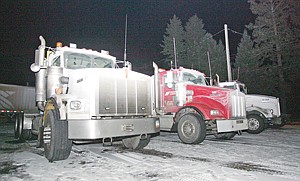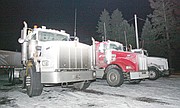Judge lifts order; cranes go to Stinger
Employees of Stinger Welding Inc. are planning to visit Libby soon to take possession of six industrial cranes now that a judge has lifted a temporary restraining order filed in November by the Lincoln County Port Authority.
District Court Judge James Manley dissolved the temporary restraining order and denied the Port Authority’s motion for a preliminary injunction on Dec. 13. Manley was the second judge to reject the Port Authority’s attempts to keep the cranes on public property in Libby while waiting for a ruling by a different judge to determine ownership of the cranes, the former Stinger Welding building at the Kootenai Business Park and other assets.
Stinger Welding was required to post a bond of $1.4 million before removing the cranes. The company posted the bond on Wednesday, said Brigid Burke, the executive director of the Port Authority. The bond essentially guarantees that the Port Authority would be compensated for the cranes at their full market value if a judge ultimately decides that the Port Authority is the rightful owner.
Ralph Seeley, former senior project manager for Stinger Welding in Libby, said the company will move quickly to take possession of the cranes.
“The trucks will be here Thursday,” Seeley said. “I think it’s clear. The cranes were purchased by Stinger to bring jobs here. The county has no right to the claims.”
Stinger Welding, a defendant in this case, has argued that the cranes and other property were purchased by the company and were now needed to fulfill work contracts in Arizona. The company took one of the cranes from the property in mid-October without the Port Authority’s permission, and returned a couple of times since then with the intention of taking the remaining six cranes.
The Port Authority, the plaintiff in this case, has argued that the cranes were purchased using grant money from the Montana Department of Commerce and, therefore, do not belong to Stinger. The Port Authority also argued that “great or irreparable damage would occur” if Stinger was allowed to remove the cranes, related to concerns that hundreds of trespasses would occur, the gate or fence would be destroyed, and a secured facility would be turned into an unsecured facility for other tenants if the cranes were removed.
Manley wrote in his decision that Port Authority attorney Allan Payne failed to prove that the Port Authority would be damaged by the removal of the cranes. He also noted that the Port Authority failed to show its claims of ownership would succeed on the merits.
“Plaintiffs’ new claim of ownership interest of the cranes is based on a vague theory that, because third party(s) loaned money or made grants, and some of the money was used to purchase the cranes, some of that money may have to be returned, and Plaintiff could possibly be liable for such ‘clawback’ provisions, and therefore Plaintiff somehow has an ownership interest in the cranes.” Manley wrote. “It is uncontested that the cranes were purchased by Stinger or one of its related companies, and the cranes are titled in the name of the purchaser, not in the name of the Plaintiff.”
Phone calls to Payne’s office and cell phones were not returned. However, Payne offered a limited reply through e-mail.
“I don’t really have a comment on the order at this time,” Payne wrote. “We hope the bond will help make the Port whole when the ownership of the cranes is finally resolved by the courts.”
The ruling by Manley settled only which entity would retain possession of the cranes while a different judge weighs evidence to determine the ownership of the cranes and other property used by Stinger to build steel spans and to assemble bridge structures during the three years in which it operated in Libby.
Judge Loren Tucker is presiding over the more comprehensive lawsuit over ownership of the assets, including the former Stinger Welding building and the 8-acre tract of land that the building sits on. According to court paperwork, Stinger purchased the property from the county for $186,000.
On Oct. 28, Tucker also removed a temporary restraining order and denied a preliminary injunction regarding possession of the cranes, prompting the county to seek similar relief from Manley, who presides over a different district.
The Port Authority originally filed the ownership lawsuit, the temporary restraining orders and the petitions for injunctive relief in Judge James Wheelis court. Stinger Welding successfully argued for substitute judges in all of those legal proceedings.
“We’re a long way from being through this,” said Brigid Burke, who recently took over as executive director of the Kootenai River Development Council, which oversees the Port Authority.
Stinger Welding was owned and operated by Carl Douglas until he died in an airplane crash in December of 2012. Fischer Industries of North Dakota and other investors assumed ownership of the company after Douglas’ death.



